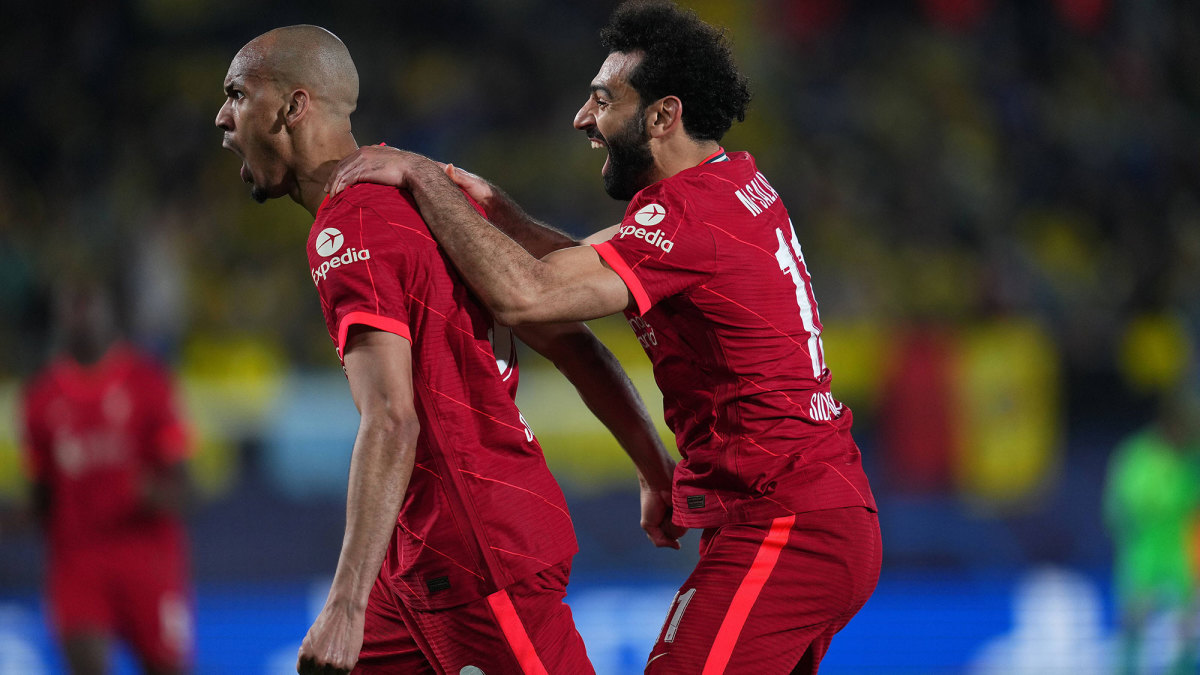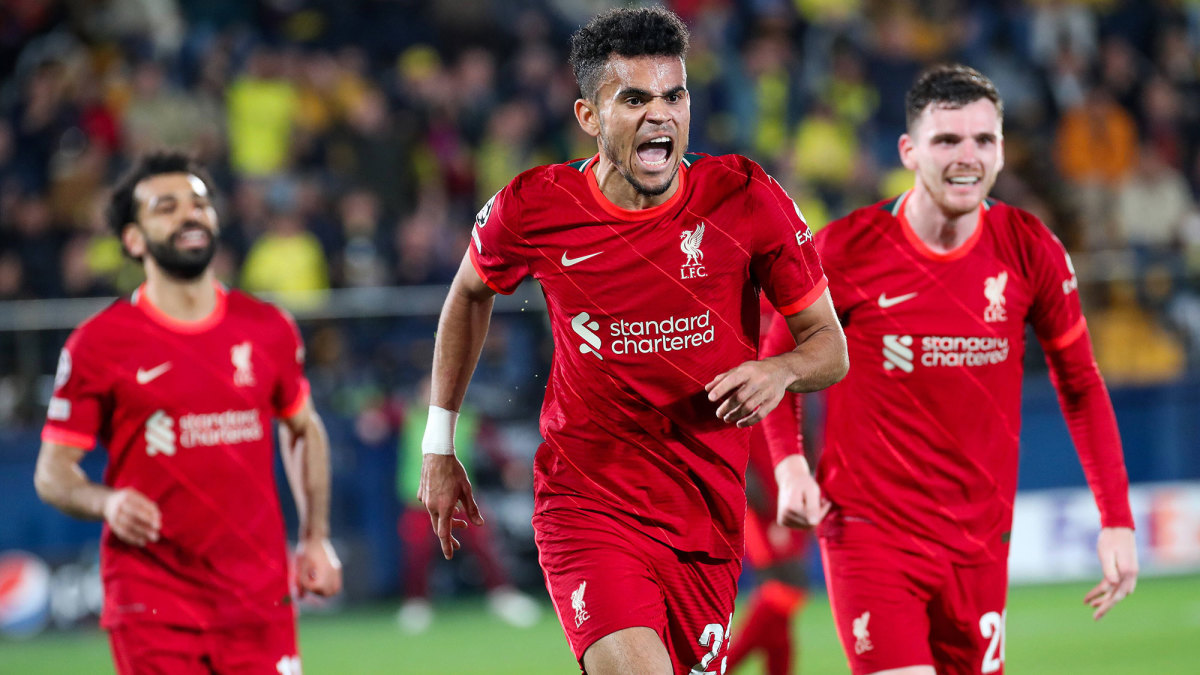Liverpool Sweats, Then Celebrates Its Return to the Champions League Final

Liverpool has reached its third Champions League final in five years, but it was a rather more stressful affair in the second leg than it had appeared it might be. What was supposed to be a procession after the 2–0 win in the first leg threatened briefly to become one of the most unexpected comebacks in European history as Villarreal went in 2–0 up at halftime, but a much-improved Liverpool performance in the second half brought a 3–2 win on the night for a 5–2 aggregate victory. Now history may await in Paris.
Jürgen Klopp will, rightly, take credit for inspiring the comeback, and it is to Liverpool’s credit that having been so sloppy it had the fortitude to rediscover its form, but few opposing goalkeepers will be quite so accommodating as Villarreal’s Gerónimo Rulli was in aiding the visitors’ effort.
“We didn’t make it easy, yeah?” Klopp said after the match. “Obviously Villarreal started incredibly well, and we didn’t get a foot in the game to be honest, and that’s why we were under pressure all of a sudden, couldn’t play football in the first half, had to react in the second, did, turned it around and made it a really special night.”

The fear for Liverpool last week was that, having dominated the first leg so absolutely, it had only won 2–0. With a third goal, the sense would have been that the tie was over, but a two-goal deficit left open the chance for a comeback. But it still seemed an extremely small chance and that, perhaps, lulled Liverpool into a false sense of security. How, after all, could a side that had been behind for less than an hour in total this year contemplate defeat to the club seventh in La Liga, particularly given it was missing Arnaut Danjuma, its most dangerous player so fan in the knockout stage?
Liverpool was lax from the opening whistle, perhaps already thinking of the weekend game against Tottenham. After all, every Premier League match until the end of the season is effectively a final given the neck-and-neck nature of its tussle with Manchester City. There had already been a cross drifting dangerously across the box when, in the third minute, Pervis Estupiñán crossed to the back post and Etienne Capoue, eluding Andy Robertson, skewed it back across goal. Boulaye Dia, in for the injured Danjuma, scored. It was well-constructed and well-executed, but it was bewildering that Estupiñán had been given so much room to measure the cross.
Suddenly, Liverpool’s passing and pressing were off, while Villarreal held the ball far better than it had last week. Naby Keïta, who had scored Liverpool’s only goal against Newcastle over the weekend, had a nightmare first half, his passing and decision-making both awry. It was his failure to get out to Estupiñán that had led to the opener and his misplaced pass that led to Giovanni Lo Celso going one-on-one against Alisson after 38 minutes. He stabbed the ball into the keeper’s chest and then tumbled over the top of him, leading to vociferous penalty appeals, although referee Danny Makkelie was probably right to turn them down.
Before halftime, though, Villarreal did level the tie on aggregate, with Capoue getting away from Robertson far too easily and crossing to the back post, where Francis Coquelin got in front of Trent Alexander-Arnold to head in—stunningly Villarreal’s seventh straight conversion from a shot on goal in the competition. Both goals Tuesday came from failings on the part of both fullbacks, which suggested a plan to exploit the defensive vulnerability of two players used to playing on the front foot. But the malaise ran deeper than that: Keïta’s pass completion in the first half was 65%, Fabinho’s 68% and Thiago’s 73%. Liverpool, uncharacteristically, simply couldn’t hold on to the ball.

Given how consistent, how remorseless, Liverpool had seemed this season, it was a major surprise to see Liverpool so rattled, so off the pace. Luis Díaz came on for Diogo Jota at halftime and, more generally, Liverpool picked up the level—although there was a suspicion that, having drawn level, Villarreal had retreated to try to hold Liverpool at arm’s length. Alexander-Arnold had already had an effort deflected onto the bar when Mohamed Salah poked a pass to Fabinho in space on the right side of the box. He had time to contemplate a cross, but in the end drilled a shot, straight at Rulli. The keeper had looked shaky in the first leg and was badly at fault as the ball went straight through him.
The relief was palpable. Díaz, who had made a huge difference, had a shot deflected against the outside of the post but then did get the second, heading in Alexander-Arnold’s left-footed cross after 67 minutes. Rulli, again, might have done better, although it was the third in the definitive 12-minute stretch for which he was most culpable. He charged from his goal, allowing Sadio Mané to skip by him about 40 yards out before rolling calmly into an empty net.
“The good thing about a bad first half is that it’s easy to improve, because it was that bad,” Klopp said. “So it was clear what we had to change. We had to find solutions, because they took all the risks in their defending, man-v-man, left the others—the half spaces on the other side completely open. It was clear. If we find these moments where we can really switch or pass the ball through the half spaces, in that moment they lose the momentum. And that’s what we tried to explain how to do that, and obviously it worked.”
As Villarreal lost discipline, Capoue collected a second yellow and was sent off in the 85th minute. By then, though, the tie had long since gone. Liverpool, having overcome a surprising wobble, is in its third final of the season. The League Cup is already won, the FA Cup is next up and the Premier League title is hanging in the balance. A head-to-head date vs. either Manchester City or Real Madrid awaits. The quadruple remains a distinct possibility.
More Soccer Coverage:
